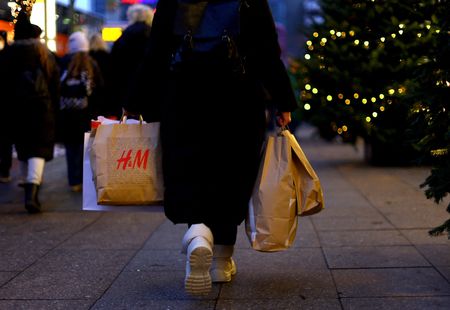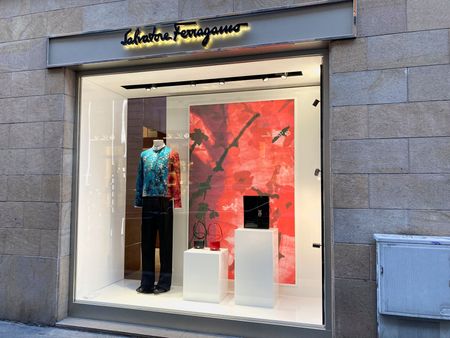LONDON (Reuters) – H&M said on Friday soaring costs had slashed its profits, the latest fast-fashion retailer to feel the pinch as consumers cut back, while LVMH and Salvatore Ferragamo revealed the damage to luxury sales caused by China’s COVID-19 policies.
Shares in H&M, the world’s No. 2 fashion retailer, fell as much as 6% in early trade after quarterly operating profit sank to 821 million Swedish crowns ($79.7 million) from 6.26 billion a year earlier. That was well below a mean forecast of 3.67 billion crowns in a Refinitiv poll of analysts.
The results highlighted the challenge for fashion retailers facing higher bills for textiles, energy and shipping at the same time as rising costs for food, energy and rents force consumers to be more picky about what they buy.
“Rather than passing on the full cost to our customers, we chose to strengthen our market position further,” CEO Helena Helmersson said in a statement.
H&M last year launched a drive to cut costs by 2 billion crowns annually, with savings from layoffs and other measures expected to start showing from the second half of 2023.
But it has struggled to keep up with bigger rival Inditex, whose flagship brand Zara aggressively raised prices last year without turning off shoppers.
Zara has outperformed rivals after selling higher-priced garments and enticing shoppers who might have otherwise spent money at luxury stores.
Britain’s Superdry on Friday cut its profit forecast for this year as its wholesale business underperformed. Its shares were down more than 18% at 1316 GMT.
Earlier this week, clothing retailer Primark cautioned economic headwinds may dent consumer spending this year.
GRAPHIC: H&M lags Zara – https://fingfx.thomsonreuters.com/gfx/mkt/lbvggokajvq/Hennes.PNG
EARNINGS SEASON
The results capped the first week of the fourth-quarter corporate earnings season, with expectations dimming further even as data has raised hopes for a soft economic landing in 2023.
U.S. results haven’t all been rosy either. Intel shocked the market late on Thursday with a revenue outlook that was behind Wall Street estimates by about $3 billion.
Even so, China’s reopening from three years of zero-COVID policies and the fact that Europe has managed to keep the lights on through the winter have spurred gains in equities.
The pan-European STOXX index is set to rise more than 6% this month for its best January since 2015.
“While it is very early days in Europe’s reporting season, the newsflow does appear to have taken a turn down, with more companies missing than beating EPS expectations for the first time in many quarters,” Morgan Stanley equity strategist Graham Secker said on Friday.
Data shows analysts have downgraded their earnings forecasts for European companies at their fastest pace this week since July 2020.
GRAPHIC: Europe earnings downgrades increase – https://fingfx.thomsonreuters.com/gfx/mkt/gdpzqwzyzvw/earnings.PNG
CHINA, CHINA
At the other end of the fast-fashion market, organic sales at the world’s biggest luxury group grew 9%, a slowdown from 20% in the first nine months of the year.
That was due to the hit in China from lockdowns and its subsequent exit from a zero-COVID policy, which has spurred a surge of infections in the world’s second-largest economy.
Beijing authorities relaxed travel curbs in December, causing problems in warehouses, stores and distribution networks for LVMH, although the company said the situation had improved markedly since the beginning of the year.
“Everybody was sick, it’s as simple as that,” LVMH’s finance chief Jean-Jacques Guiony said.
Europe’s most valuable listed company, LVMH owns dozens of high-end labels including fashion houses Louis Vuitton and Dior.
Disappointment over the impact of the China disruptions on its margins caused a record-breaking run in LVMH shares to briefly halt on Friday. The stock was down 0.65%.
The details echoed those from Richemont and Burberry last week.
The luxury industry is nevertheless expected to be one of the biggest winners from the loosening of restrictions that kept shoppers out of stores in China for months.
Salvatore Ferragamo likewise blamed a slowdown in the fourth quarter on COVID restrictions in China as the Italian luxury goods group reported a 5.7% rise in sales at constant exchange rates last year.
In contrast, Remy Cointreau cautioned it expected U.S. demand for cognac to weaken well into 2023. The outlook came after the French spirits maker posted lower third-quarter sales as positive effects from the coronavirus pandemic fizzled out.
That echoed comments from the world’s largest spirits maker Diageo, who on Thursday signalled that robust demand for its drinks as people made cocktails at home during lockdowns may be slowing in some markets, particularly North America.
(Reporting by Reuters; Writing by Josephine Mason; Editing by Catherine Evans)



